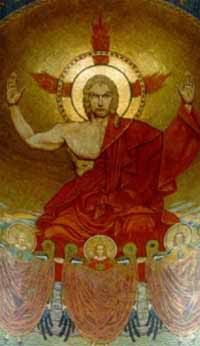Pope think

Both before and since his elevation to the papacy, Benedict has taken a consistent approach to controversial issues: he locates the assumptions and fundamental principles underlying the controversy, analyzes their "inner" structure or dynamism, and lays out the consequences of the principles.
link
For example, in Deus Caritas Est, Benedict does not address directly the controversial issues of homosexual partners, promiscuity, or divorce. Instead he examines the "inner logic" of the love of eros, which is "love between man and woman, where body and soul are inseparably joined . . ." He shows that it has been understood historically to have a relationship with the divine ("love promises infinity, eternity") and to require "purification and growth in maturity ... through the path of renunciation". In love's "growth towards higher levels and inward purification ... it seeks to become definitive ... both in the sense of exclusivity (this particular person alone) and in the sense of being 'for ever'."
So starting from the "inner logic" of the fundamental reality of love, Benedict concludes to an exclusive and permanent relationship between a man and a woman. That is a fair description of the Catholic idea of marriage, and it excludes homosexual partners, promiscuity, and divorce.Incidentally, in the very first paragraph of this encyclical, Benedict states: "
In a world where the name of God is sometimes associated with vengeance or even a duty of hatred and violence, this message [that God is love] is both timely and significant." Clearly the religious justification of violence is an aberration that's on his mind.
Certainly, it may sound provocative to make the claim the Emperor did. But why (since Christians believe that God's full and definitive revelation has come with Christ, who brings all prophecy to an end) isn't it just as provocative for a Muslim to proclaim that Mohammed is a new prophet, bringing new revelation that corrects and supplements that of Christ?
Is it really offensive to say that Christians and Muslims disagree profoundly about this? Is not this the necessary starting point that must be recognized before any religious dialogue can even begin?
And if the response from Islam is violence, then must we not ask precisely the question raised by Benedict: Is this violence an aberration that is inconsistent with genuine Islam (as similar violence by Christians would be an aberration inconsistent with genuine Christianity)? Or is it justifiable on the basis of Islam's image of God as absolutely transcending all human categories, even that of rationality? And if the response to this question is violence, then the question has been answered existentially, and rational dialogue has been repudiated.
The Pope's theological speech does not lend itself to the tabloid headings
that are making the anger around the world.
He is not an easy read that can be explained in modern sound bites.
That he is sorry that he upset the rioting crowds is true, but he can not
retract to the point of silencing disscussion. That is, if discussion is
possible.




0 Comments:
Post a Comment
<< Home